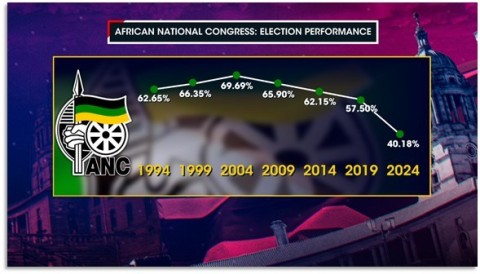The recent elections have delivered a seismic jolt to South African politics, reshaping the landscape in unprecedented ways.
The African National Congress (ANC), the party that has dominated the nation since the end of apartheid, has suffered a dramatic and historic defeat, losing a staggering 71 seats in Parliament.
Their support has plummeted from 57% in 2019 to a mere 40% this year, a sharp 17 percentage point decline that signals profound shifts in the electorate's sentiment. The results reflect a growing public disillusionment with the ANC, spurred by years of corruption scandals, economic stagnation, and unmet promises.
Voters have turned to opposition parties in greater numbers, signalling a desire for change and accountability.
Here’s a closer look at how the ANC has performed over the years:

1994: The ANC wins 62.65% of the vote in the first democratic elections, establishing itself as the dominant political force in the new South Africa.
1999: The ANC secures 66.35% of the vote, consolidating its power and demonstrating increased public support during its first term in office.
2004: The party reaches its zenith with 69.69% of the vote, solidifying its control over the National Assembly.
2009: The ANC secures 65.90% of the vote, maintaining a strong majority but showing signs of decreasing support compared to the previous election.
2014: The party receives 62.15% of the vote, continuing a downward trend as public confidence in the ANC's governance begins to wane
2019: Support declines to 57.50%, indicating growing voter dissatisfaction and a loss of confidence in the party’s ability to govern effectively.
2024: The ANC tumbles to 40.18%, heralding the end of single-party dominance and the beginning of a more fragmented and competitive political era.
This year’s election outcome ushers in a new phase of South African politics, characterised by coalition-building and power-sharing.
What’s Next?
With the ANC no longer able to govern without coalition partners, the political landscape is set for significant changes.
Other parties will now wield considerable influence, potentially reshaping policies and governance strategies. This could lead to a more dynamic and responsive government but also risks instability and gridlock if consensus cannot be reached.
For the ANC, this dramatic fall from grace necessitates a period of introspection and reform. If it hopes to regain its former stature, the party must address the issues that have eroded public trust, from corruption to economic mismanagement.
For South Africans, this moment is both a challenge and an opportunity. The end of ANC hegemony could pave the way for more accountable and transparent governance, driven by diverse voices and perspectives.
However, the road ahead is uncertain, and much will depend on the ability of the new political actors to navigate this complex and evolving landscape.
The era of single-party dominance is over. What comes next could redefine the future of South African governance and democracy. The nation stands at a crossroads, with the potential for profound transformation.
Denga Mavhunga is a member of the eNCA Academy of Journalism
*This article is the opinion of the author and does not reflect the views of eNCA

